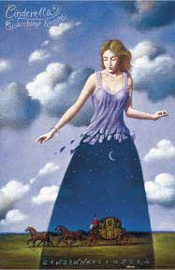
08 Jun 2006
ROSSINI: La Cenerentola
La Cenerentola, ossia La bontà in trionfo. Dramma giocoso in two acts.
Music composed by Gioacchino Rossini (1792–1868). Libretto by Jacopo Ferretti after Perrault.
Andromaca: Dramma per musica in three acts.
Ermione: Azione tragica in two acts.
Ippolito ed Aricia: Tragedia in five acts.
Idomeneo: Opera seria in three acts.
Paride ed Elena: Dramma per musica in five acts.
Orphée: Opera in four acts.
Music composed by Christoph Willibald Gluck (arranged by Hector Berlioz, 1859). Libretto by Ranieri de' Calzabigi
Alceste, ou Le triomphe d’Alcide: Tragédie en musique in a prologue and five acts.
Alceste: Tragédie opéra in three acts.
Medea: Melodramma tragico in three acts.
Oedipe à Colone: Tragédie lyrique in three acts.
Elektra: Tragedy in one act.
Fedra: Dramma per musica in two acts.
Les Troyens: Grand opéra in five acts.
Die Meistersinger von Nürnberg: Music drama in three acts.
Ariadne auf Naxos, Oper with a prologue and one act. Music composed by Richard Strauss. Libretto by Hugo von Hofmannsthal.
Der Schauspieldirektor [The Impresario], Singspiel in one act, K486.
Divertimento teatrale in one act.
Andrea Chénier, an opera in four acts.
La figlia del reggimento [La Fille du régiment (‘The Daughter of the Regiment’)], Opéra comique in two acts.
L’elisir d’amore, Melodramma giocoso in two acts.

La Cenerentola, ossia La bontà in trionfo. Dramma giocoso in two acts.
Music composed by Gioacchino Rossini (1792–1868). Libretto by Jacopo Ferretti after Perrault.
Streaming Audio
First Performance: 25 January 1817, Teatro Valle, Rome.
| Principal Characters: | |
| Cenerentola (Angelina), Don Magnifico’s step-daughter | Contralto |
| Don Ramiro, Prince of Salerno | Tenor |
| Dandini, valet to Don Ramiro | Bass |
| Don Magnifico, Baron of Monte Fiascone | Baritone |
| Clorinda, his daughter | Soprano |
| Tisbe, his daughter | Mezzo-Soprano |
| Alidoro, a philosopher, tutor to Don Ramiro | Bass |
Setting: Don Magnifico’s mansion and the court of Don Ramiro
Synopsis:
Act I
Don Magnifico's palace.
Introduction: "No, no, no, no: non v'è": Baron Don Magnifico lives here with his daughters Clorinda and Tisbe and his stepdaughter Angelina, known as Cenerentola (Cinderella). The stepfather has cheated her out of her entire fortune, and keeps her in the house as a scullery maid.
Alidoro, the tutor and confidant of the local Prince, Don Ramiro, is looking for a suitable bride of equal rank and station for his protégé. Disguised as a beggar, he discovers how generous Cenerentola is, and how heartless her two sisters are. Some noblemen arrive to tell them that the prince is entertaining thoughts of marriage, and they invite all the young ladies in the land to his castle.
Recitative and cavatina: "Miei rampolli feminini" The two sisters are madly excited over the invitation to the castle, as is their father. Don Magnifico is enchanted with the thought of seeing a secret dream come true and having one of his daughters marry the prince.
Scene and duet: "Un soave non so che in quegl' occhi scintillò" Don Ramiro, disguised as a servant falls in love with Cenerentola.
Chorus and cavatina: "Come un' ape ne' giorni d'aprile" The servant Dandini, disguised as the prince, appears, escorted by the noblemen, and while Don Magnifico looks on, he courts the Baron's two daughters.
Recitative and quintet: "Signor, una parola": Cenerentola begs Don Magnifico to allow her to go to the prince's ball, but he refuses. Don Magnifico tells Alidoro, who would like to meet all three daughters, that Cenerentola is just a lowly scullion, and his third daughter has died.
Recitative and aria: "Vasto teatro è il mondo": Alidoro comforts Cenerentola and promises to escort her to the ball.
Prince Don Ramiro's palace.
Recitative: "Ma bravo! Ma bravo!": Dandini, still disguised as the prince, appoints Don Magnifico chief wine steward.
Chorus and aria: "Intendente, reggitor" Don Magnifico performs the duties of his new office.
Duet and finale: "Zitto, zitto, piano, piano": Dandini reports to Ramiro how stupid the two sisters are. Unexpectedly Cenerentola appears, grandly attired. Everybody is struck by this beauty's remarkable similarity to Cenerentola. Banquet.
Act II
Prince Don Ramiro's palace.
Recitative and aria: "Sia qualunque delle figlie": Don Magnifico and his two daughters discuss their prospects: they are firmly convinced they will win the game.
Recitative and aria: "Si, ritrovarla io giuro": Cenerentola gives Don Ramiro a bracelet, and before disappearing she tells him look for her. Another bracelet, which she always wears, will enable him to recognize her.
Recitative and duet: "Un segreto d'importanza": Don Magnifico tries to get Dandini to tell him whether he has chosen Clorinda or Tisbe. Dandini, in response, reveals his true identity.
Don Magnifico's palace.
Song: "Una volta c'era un re": Cenerentola has returned to her usual place.
Recitative and thunderstorm: Don Magnifico and his two daughters return home in a fury.
Recitative and sextet: "Siete voi": Don Ramiro appears, this time clad in his princely raiment and escorted by Dandini. He recognizes the bracelet on Cenerentola's wrist. He wishes to make her his wife. Don Magnifico and his two daughters are beside themselves with anger.
Chorus, scene and rondo finale: "Nacqui all'affano, al pianto": The courtiers pay homage to their new princess, Cenerentola. Clorinda and Tisbe beg her forgiveness, which she generously grants. With everyone deeply moved, the curtain falls.
[Synopsis: Bayerische Staatsoper]